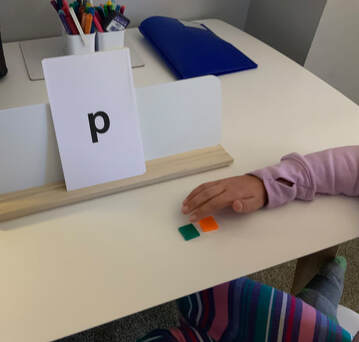|
Recently, we completed Orton-Gillingham Comprehensive Plus training offered by the Institute for Multi-Sensory Education (IMSE). There are many reasons for this, including the patterns we have seen emerge among the many literacy learners we assess and instruct: lack of phonics knowledge, lack of fluency with reading and writing high-frequency words, difficulty with and aversion to writing, and a deep desire to read at the level needed to fully participate in the classroom. As usual, learners are our guides to gaining the tools we need to instruct them better.
In the past, we created a Reading Toolkit for one of our partners, The Sandra Dunagan Deal Center for Language and Learning in Georgia. Through that process, we learned a great deal about multi-sensory instruction and became curious about how it could be most effectively used with our learners. We also picked up a text titled Proust and the Squid by Maryanne Wolf and read it together. Our thinking continued to shift and expand. We learned about appropriate use of decodable books from a professional development session by Pam Kastner. Soon thereafter, I read a recommendation from a Literacy Specialist regarding the use of word sorts, such as Words Their Way, and Orton-Gillingham. I had already noticed that some of my learners needed modified sorts and some really struggled to understand them. A scope and sequence from Recipe for Reading by Nina Traub was cited and that set me on the path of learning how I could use this to make my word sort instruction more effective. This led to a commitment to 30 hours of Orton-Gillingham training. Learning how to teach reading and writing (listening and speaking, too) is a life-long journey. There are many opportunities to reflect on what is and isn't benefitting students and to try to understand the reasons why. We have both sought as much professional development and coursework possible to expand our scope of practice. That has lead us to the National Board Certification process, to Literacy Specialist Certification and to many conferences, books, articles, and peers who we believed could help us help students. Now we have added Orton-Gillingham instruction to our toolboxes and we have immediately seen positive results with many students. This is happening at a time when Science of Reading is getting a lot of attention, especially where we live and work, and it is helping us form and reform our beliefs and understandings about how students learn to read. If you would like to know more about this topic, or others related to literacy, take a look a our podcast page. Our podcast is titled Academic Conversation with Merten & Morgan and in it we discuss our literacy journey, including a series about Proust and the Squid. You can also reach out in the comments, on Facebook, or using our gmail: [email protected]. We love to learn alongside teachers, families, caregivers, and others who want to build a literate future for all students. Comments are closed.
|
Details
AuthorMerten & Morgan Consulting, LLC ArchivesCategories |


 RSS Feed
RSS Feed